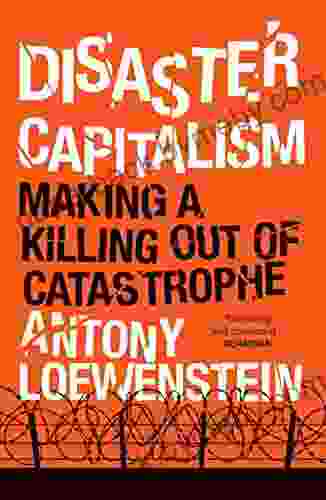Disaster Capitalism: Making a Killing Out of Catastrophe

Disasters are not just natural occurrences. They are also opportunities for the wealthy and powerful to make money. This is the central thesis of Naomi Klein's groundbreaking book, Disaster Capitalism: Making a Killing Out of Catastrophe.
4.7 out of 5
| Language | : | English |
| File size | : | 1446 KB |
| Text-to-Speech | : | Enabled |
| Screen Reader | : | Supported |
| Enhanced typesetting | : | Enabled |
| Word Wise | : | Enabled |
| Print length | : | 384 pages |
Klein argues that disasters are not just natural occurrences, but also social and political events. They are often caused by human activities, such as climate change and pollution. And they disproportionately affect the poor and vulnerable.
In the wake of a disaster, governments and corporations often rush to privatize public services, such as water, electricity, and healthcare. They also cut taxes for the wealthy and corporations, while raising taxes on the poor. This creates a situation in which the rich get richer and the poor get poorer.
Klein provides numerous examples of disaster capitalism in action. She shows how corporations have profited from the wars in Iraq and Afghanistan, the Hurricane Katrina disaster, and the Fukushima nuclear disaster. She also shows how the wealthy and powerful have used disasters to justify the expansion of surveillance and the erosion of civil liberties.
Disaster Capitalism is a powerful and disturbing book. It exposes the ways in which the wealthy and powerful profit from the suffering of others. It is a must-read for anyone who wants to understand the world we live in.
Table of Contents
- Chapter 1: The Shock Doctrine
- Chapter 2: Disaster Profiteering
- Chapter 3: The Privatization of Disaster Relief
- Chapter 4: The Militarization of Disaster
- Chapter 5: The Climate Catastrophe
- Chapter 6: The Future of Disaster Capitalism
Chapter 1: The Shock Doctrine
In Chapter 1, Klein introduces the concept of the "shock doctrine." She argues that disasters create a state of shock in which people are more likely to accept radical changes to the social Free Download. This is why governments and corporations often use disasters as an opportunity to push through unpopular policies.
Klein provides several examples of the shock doctrine in action. She shows how the Bush administration used the 9/11 attacks to justify the invasion of Iraq and the expansion of the surveillance state. She also shows how the Thatcher government used the Falklands War to privatize public services and roll back the welfare state.
Chapter 2: Disaster Profiteering
In Chapter 2, Klein examines the ways in which corporations profit from disasters. She shows how corporations have made billions of dollars from the wars in Iraq and Afghanistan, the Hurricane Katrina disaster, and the Fukushima nuclear disaster.
Klein argues that disaster profiteering is not just a matter of corporations taking advantage of a crisis. It is also a deliberate strategy by governments and corporations to privatize public services and make money off of the suffering of others.
Chapter 3: The Privatization of Disaster Relief
In Chapter 3, Klein examines the privatization of disaster relief. She shows how governments have increasingly contracted out disaster relief services to private companies.
Klein argues that the privatization of disaster relief is a disaster in itself. Private companies are often more interested in making a profit than in providing effective relief.
Chapter 4: The Militarization of Disaster
In Chapter 4, Klein examines the militarization of disaster. She shows how militaries have increasingly been used to respond to disasters.
Klein argues that the militarization of disaster is a dangerous trend. It creates a situation in which disaster relief is seen as a military operation, rather than a humanitarian operation.
Chapter 5: The Climate Catastrophe
In Chapter 5, Klein examines the climate catastrophe. She argues that climate change is the greatest threat facing humanity today.
Klein shows how climate change is already causing more frequent and severe disasters. She also shows how climate change is disproportionately affecting the poor and vulnerable.
Chapter 6: The Future of Disaster Capitalism
In Chapter 6, Klein looks to the future of disaster capitalism. She argues that the trend towards disaster capitalism is likely to continue.
However, Klein also argues that there is hope for a better future. She calls for a new system that is based on solidarity and cooperation, rather than on greed and exploitation.
Disaster Capitalism is a powerful and disturbing book. It exposes the ways in which the wealthy and powerful profit from the suffering of others. It is a must-read for anyone who wants to understand the world we live in.
Klein's book is a call to action. She argues that we must not accept disaster capitalism as inevitable. We must fight for a better future, a future in which everyone has a chance to live a good life.
4.7 out of 5
| Language | : | English |
| File size | : | 1446 KB |
| Text-to-Speech | : | Enabled |
| Screen Reader | : | Supported |
| Enhanced typesetting | : | Enabled |
| Word Wise | : | Enabled |
| Print length | : | 384 pages |
Do you want to contribute by writing guest posts on this blog?
Please contact us and send us a resume of previous articles that you have written.
 Book
Book Novel
Novel Page
Page Chapter
Chapter Text
Text Story
Story Genre
Genre Reader
Reader Library
Library Paperback
Paperback E-book
E-book Magazine
Magazine Newspaper
Newspaper Paragraph
Paragraph Sentence
Sentence Bookmark
Bookmark Shelf
Shelf Glossary
Glossary Bibliography
Bibliography Foreword
Foreword Preface
Preface Synopsis
Synopsis Annotation
Annotation Footnote
Footnote Manuscript
Manuscript Scroll
Scroll Codex
Codex Tome
Tome Bestseller
Bestseller Classics
Classics Library card
Library card Narrative
Narrative Biography
Biography Autobiography
Autobiography Memoir
Memoir Reference
Reference Encyclopedia
Encyclopedia Stacy Gregg
Stacy Gregg Ken Venturi
Ken Venturi Kim Heacox
Kim Heacox Necoco
Necoco L S Summer
L S Summer Vernon Domingo
Vernon Domingo William L Cleveland
William L Cleveland Sonia Hartl
Sonia Hartl Linda Lael Miller
Linda Lael Miller Khaled Fahmy
Khaled Fahmy Stephanie Garber
Stephanie Garber Luke Amadeus Ranieri
Luke Amadeus Ranieri Petru Popescu
Petru Popescu Selah Helms
Selah Helms Mark Cooper
Mark Cooper Philippe Nessmann
Philippe Nessmann Ken Johnson
Ken Johnson Peter Hathaway Capstick
Peter Hathaway Capstick S A Evergreen
S A Evergreen Pero Tafur
Pero Tafur
Light bulbAdvertise smarter! Our strategic ad space ensures maximum exposure. Reserve your spot today!

 Amir SimmonsThe Shamanic Way of the Bee: Unlocking the Transformative Power of Nature's...
Amir SimmonsThe Shamanic Way of the Bee: Unlocking the Transformative Power of Nature's... Brenton CoxFollow ·13.1k
Brenton CoxFollow ·13.1k Chadwick PowellFollow ·19.7k
Chadwick PowellFollow ·19.7k Roger TurnerFollow ·8.3k
Roger TurnerFollow ·8.3k Donovan CarterFollow ·8.4k
Donovan CarterFollow ·8.4k Fletcher MitchellFollow ·8k
Fletcher MitchellFollow ·8k Maurice ParkerFollow ·3.6k
Maurice ParkerFollow ·3.6k Glenn HayesFollow ·17k
Glenn HayesFollow ·17k Stanley BellFollow ·13.1k
Stanley BellFollow ·13.1k

 Isaac Asimov
Isaac AsimovEmbark on an Epic Adventure: The Colorado Trail 9th...
Unveiling the Treasures of the Colorado...

 Clinton Reed
Clinton ReedUltimate Football Heroes: Uncover the Gridiron Greatness...
Enter the World...

 Ibrahim Blair
Ibrahim BlairUnveiling the Secrets of Stolen Focus: A Journey to...
In today's relentless digital...

 Colt Simmons
Colt SimmonsRediscover the Founding Father's Vision: Thomas Jefferson...
Immerse Yourself in the Unedited Words of...

 Juan Butler
Juan ButlerExcel in Language Learning: The Ultimate Self-Study...
Unlock Your Language Potential with Our...
4.7 out of 5
| Language | : | English |
| File size | : | 1446 KB |
| Text-to-Speech | : | Enabled |
| Screen Reader | : | Supported |
| Enhanced typesetting | : | Enabled |
| Word Wise | : | Enabled |
| Print length | : | 384 pages |












